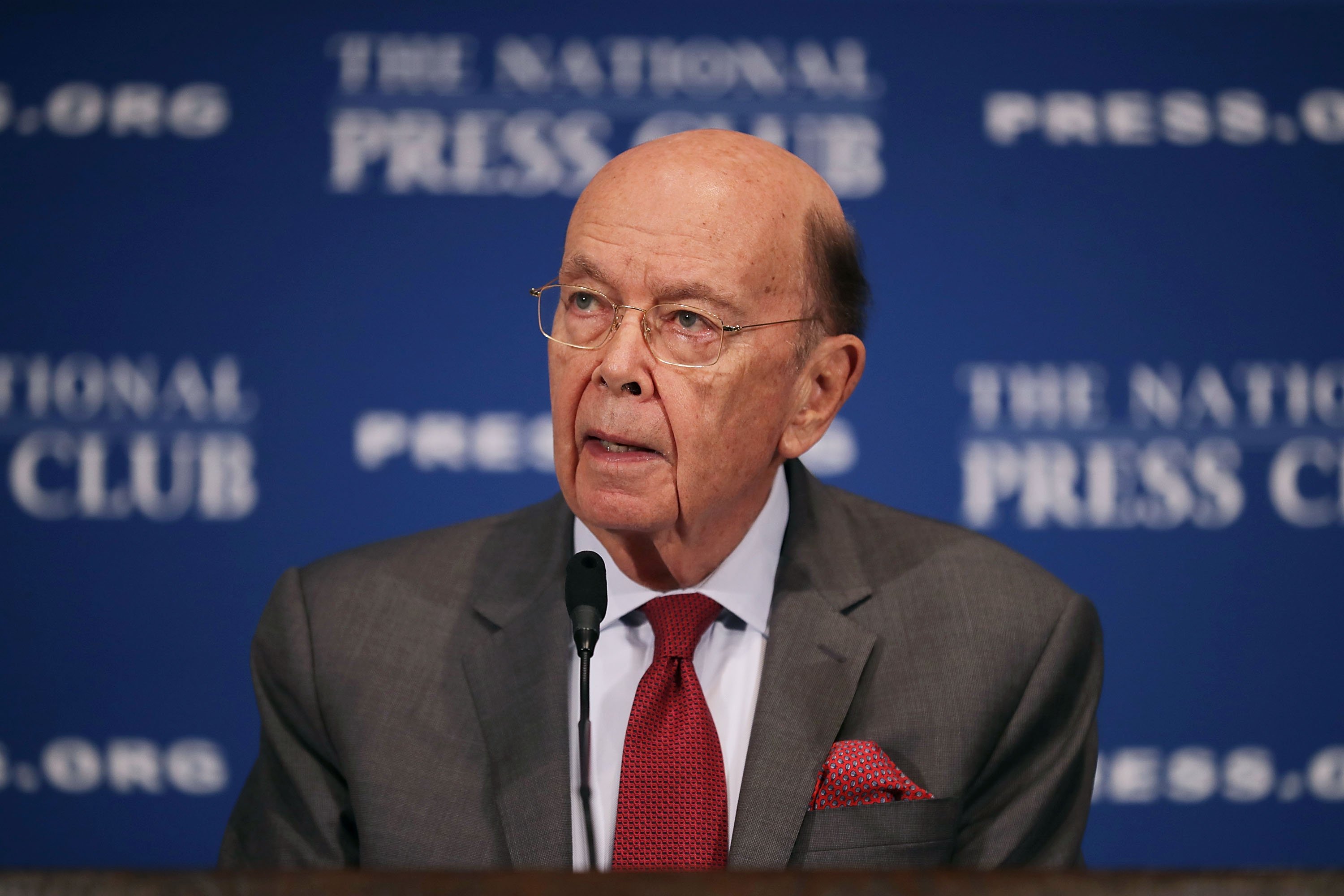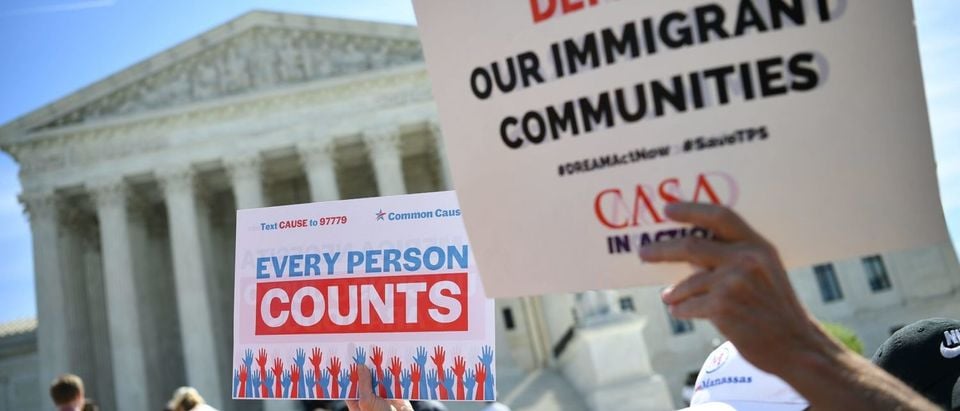- In a mixed ruling for the Trump administration, the Supreme Court ordered further proceedings in the census citizenship question case Thursday.
- Chief Justice John Roberts led the high court in concluding that the administration covered up its true rationale for adding the citizenship question.
- The government will have another chance to present new explanations for its decision in the coming months.
The Supreme Court ordered further proceedings in the dispute over a citizenship question on the 2020 census form Thursday, saying the Trump administration apparently concealed its true reason for adding the query.
Chief Justice John Roberts delivered the Court’s opinion, portions of which were unanimous.
“It is rare to review a record as extensive as the one before us when evaluating informal agency action — and it should be,” Roberts wrote. “But having done so for the sufficient reasons we have explained, we cannot ignore the disconnect between the decision made and the explanation given. Our review is deferential, but we are ‘not required to exhibit a naiveté from which ordinary citizens are free.'”
The government claims it needs citizenship information to improve enforcement of the Voting Rights Act (VRA), but Roberts said “the evidence tells a story that does not match the explanation the secretary gave for his decision.”
The Department of Commerce, which supervises the Census Bureau, must now identify a more developed explanation for the citizenship question, and present it to the courts for approval. Yet it is unclear whether that is possible as a matter of timing, since the government has insisted that census forms must be finalized by late June to ensure timely printing and distribution.
In a partial victory for the administration, the justices rejected a number of legal arguments lodged against the citizenship question.
For example, the Court said the question does not violate the Constitution’s enumeration clause, which requires an “actual enumeration” of the population. Critics say the question runs afoul of the Constitution because it could depress participation in the census, thus preventing a full and accurate counting.
“In light of the early understanding of and long practice under the enumeration clause, we conclude that it permits Congress, and by extension the secretary, to inquire about citizenship on the census questionnaire,” Roberts wrote.
The Court also rejected lower court findings that the citizenship question violates the Census Act. The plaintiffs argued Ross broke that law by failing rely on other sources to gather citizenship information. They also said Ross violating a provision requiring him to inform Congress of his plans for the census three years in advance. The chief justice’s opinion rejected both contentions.
Still, the key point for Roberts was that the evidence suggests Ross appended the citizenship question for reasons other than his stated rationale.
“Accepting contrived reasons would defeat the purpose of the enterprise,” Roberts wrote. “If judicial review is to be more than an empty ritual, it must demand something better than the explanation offered for the action taken in this case.”
The Court emphasized that Trump or some future administration might still add a citizenship question — but for the time being, the question would be barred from the 2020 census form.
“We do not hold that the agency decision here was substantively invalid,” the decision reads.
Justice Clarence Thomas led the conservatives in a partial dissent, joined by Justices Neil Gorsuch and Brett Kavanaugh. Thomas said Thursday’s decision is the first time the high court invalidated government action because of a decision-maker’s suspect motives.
“It is not difficult for political opponents of executive actions to generate controversy with accusations of pretext, deceit, and illicit motives,” Thomas wrote. “Significant policy decisions are regularly criticized as products of partisan influence, interest group pressure, corruption, and animus.”
“The law requires a more impartial approach,” Thomas added elsewhere.
In his own partial dissent, Justice Samuel Alito said the Commerce Department’s decision to include the citizenship field is not reviewable in court. He also said citizenship questions are common practice in many other countries and were a regular feature of U.S. census forms in the past.
“It is a sign of our time that the inclusion of a question about citizenship on the census has become a subject of bitter public controversy and has led to today’s regrettable decision,” Alito wrote. While the decision to place such a question on the 2020 census questionnaire is attacked as racist, there is a broad international consensus that inquiring about citizenship on a census is not just appropriate but advisable.”
“No one disputes that it is important to know how many inhabitants of this country are citizens,” Alito added. (RELATED: Here’s How Many 2020 Democrats Support Expanding The Supreme Court)

Commerce Secretary Wilbur Ross delivers keynote remarks during the Newsmakers Luncheon at the National Press Club on May 14, 2018. (Chip Somodevilla/Getty Images)
A coalition of advocacy groups including the American Civil Liberties Union (ACLU) joined left-leaning state and city governments to sue the administration after Commerce Secretary Wilbur Ross ordered the Census Bureau to include the citizenship question. The plaintiffs fear such questions discourage minority participation.
Since seats in Congress and federal funds are apportioned on the basis of population, the plaintiffs fear losing legislative representation and federal aid. Some figures suggest as many as 6 million individuals could be excluded from the census count if the citizenship question is incorporated.
In a somewhat unusual move, the high court agreed to take the census case before a lower federal appeals court had a chance to review it, given the time crunch government officials face to complete the questionnaire.
The Court appeared poised to allow the citizenship question during oral arguments in April. The dispute was upended at a late stage, however, when the plaintiffs claimed to uncover decisive evidence proving the administration means to use granular citizenship data to give a boost to Republicans during the redistricting process — and that government witnesses concealed as much during the litigation.
That evidence, the plaintiffs claim, shows that top census aides worked with a Republican redistricting guru who found that redistricting based on voting age population — instead of the total number of people — would give an advantage to “Republicans and non-Hispanic whites.”
The administration vigorously denied those allegations in its own counter-filings, accusing the plaintiffs of waging an “eleventh-hour campaign to improperly derail the Supreme Court’s resolution of the government’s appeal.” Speaking after the plaintiffs lodged those allegations, senior members of the administration denied any such partisan conspiracies in a closed-door testimony before a congressional committee.
U.S. District Judge Jesse Furman found the administration unlawfully appended the citizenship question to the census survey in a sweeping January ruling, writing that the government had committed “a veritable smorgasbord of classic, clear-cut Administrative Procedure Act violations.” That means the government failed to follow rules and procedures proscribed by law when it changed the census form.
For example, Furman said Ross was hiding his true reason for ordering the Census Bureau to include the citizenship question.
“Finally, and perhaps most egregiously, the evidence is clear that Secretary Ross’s rationale was pretextual — that is, that the real reason for his decision was something other than the sole reason he put forward in his memorandum,” Furman wrote.
Two subsequent decisions reached similar conclusions, including findings that the citizenship question violated the Constitution.
The citizenship question was a common feature of the census form until the 1950s. President Donald Trump claimed executive privilege over documents relating to the census on June 12. The Justice Department told House Democrats that those records include “attorney-client communications, attorney work product, and deliberative communications.”
This is breaking news. This post will be updated
All content created by the Daily Caller News Foundation, an independent and nonpartisan newswire service, is available without charge to any legitimate news publisher that can provide a large audience. All republished articles must include our logo, our reporter’s byline and their DCNF affiliation. For any questions about our guidelines or partnering with us, please contact licensing@dailycallernewsfoundation.org.












